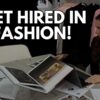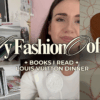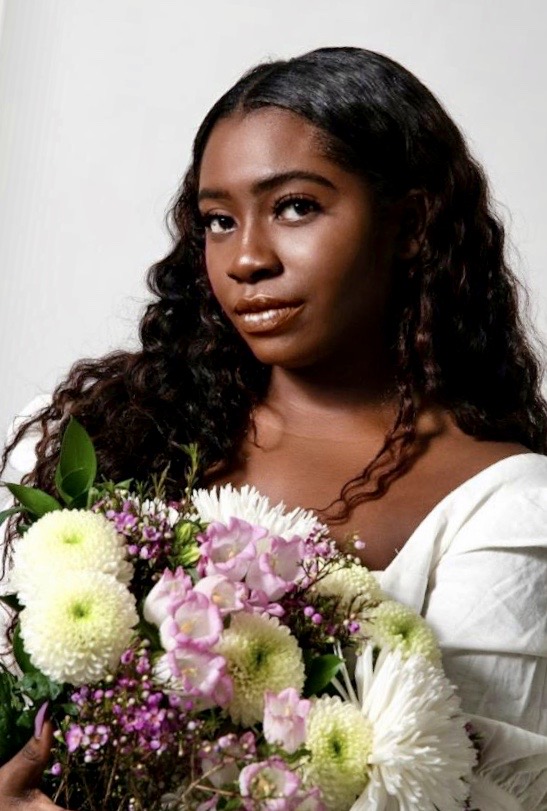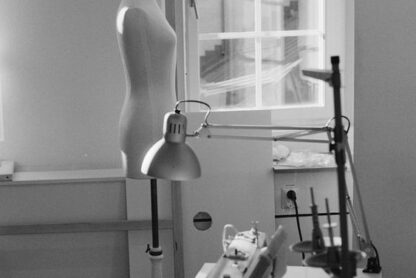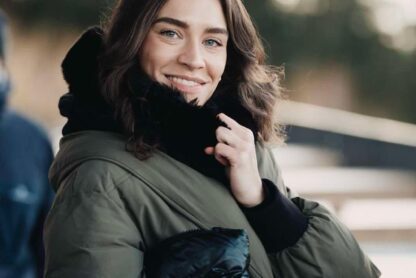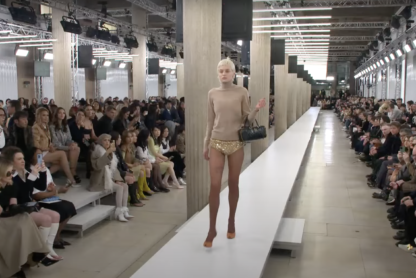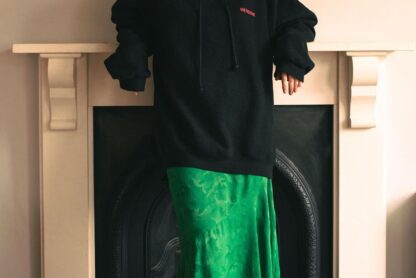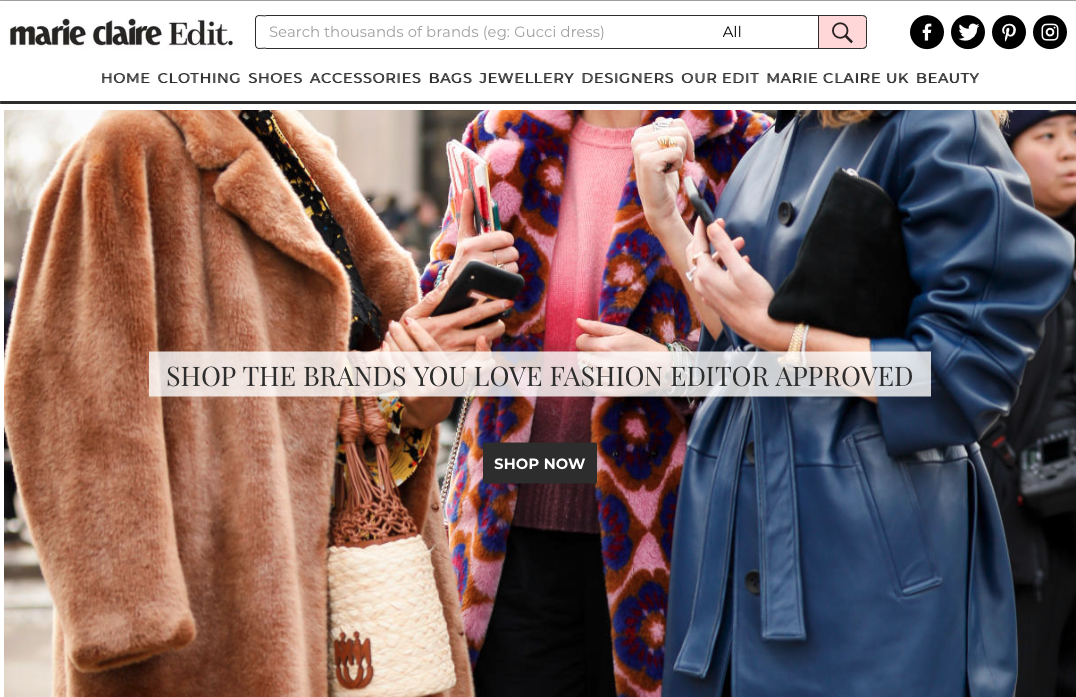
Drea Jossell though she wanted to become a fashion designer when she moved to New York City to study this and pursue her career in fashion.
She started with an internship at Interview Magazine and working at Mara Hoffman before landing her internship at Rick Owens that turned into her current full-time job as Showroom Coordinator. In this interview, we chat about her beginning in the fashion industry, what she did to get started and what she does today as Showroom Coordinator. When I asked her what she would change about the fashion industry, we talked about how at every job in fashion she was the only person of color.
Enjoy this interview to learn many tips on how to get started in the fashion industry and to reflect on how the industry should be more inclusive.
1.Hi Drea, welcome to Glam Observer! Could you please introduce yourself?
Hi Glam Observer !
My name is Drea Jossell!
I am originally from the Chicago, Illinois. I moved to New York City to pursue fashion and studied at The Art Institute of New York City majoring in Fashion Design. After finishing my studies, I decided to stay in New York to pursue my career in Fashion Design which eventually led to me becoming the showroom coordinator at Rick Owens. Since my time there, after leaving and taking on a less full-time role, I’ve branched out to freelancing and consulting.
2. What did you study?
I studied Fashion Design while at The Art Institute. At the time fashion design was a huge passion for me and something that I felt naturally inspired by.
3. How and when did you realize you wanted to start a career in fashion?
I knew I wanted to start a career in fashion at a very early age. My daily inspiration was from my Mother, Aunts and Grandmother. While growing up, my mom was a high school administrator and every day she would wear what was deemed a power suit. I would be in awe of her clothing in her closet and her attention to detail, I remember being a child and still wanting to borrow pieces from her closet or at least try them on. I would also see my aunts often and they were also always dressed so well. They inspired my love for power suits and over all monochrome / matching outfits.
My grandmother, Cordelia Jossell was a seamstress in Mississippi. I would hear so many stories growing up of all the amazing wedding dresses she would make. This really inspired me because I figured, if she could do it, I could do it.
4. What did you do in the beginning when you wanted to enter this industry?
When I knew that I wanted to enter the fashion world, I thought about my path and wondered how I was going to do this in Chicago. When I started high school, my thoughts were on how I plan my path where it could lead me to working in fashion on a daily basis. During my second year of high school, I met an amazing Theater director –and soon to be mentor,– Kevin Wall. Kevin was the Technical Director of our high school’s theater group. After meeting him, he inspired me to join the theater as a student costume designer. This opportunity provided the structure, skillset, and guidance that I needed to prepare a portfolio and get accepted to top fashion schools. I ended up choosing the Art Institute because of the vast opportunities in New York for internships.
5. How did you get your first internship working in the Closet of Interview Magazine?
I immediately felt anxious when I started looking for internships because New York was not my home state and I had no experience working in New York. However I thought, go for it ! The worst anyone can tell you in an interview is ‘no.’ After the second interview, I landed the internship.
My school and my internship workload were intense leaving me with little to no days off so I would not recommend that route for a first-year student. I learned so much during this internship, such as time management when given many projects, resourcefulness, and attention to detail.
6. After your internship at Interview Magazine, you went to Mara Hoffman and worked there for more than 3 years. What did you do?
I remember walking into her studio that was in the flower district at the time and interviewing while being so nervous! I literally started the next day and could not have been happier. Mara Hoffman’s brand, ideals, work culture, staff… everything was so amazing to be around. I wouldn’t trade that experience for the world !
After my 3 months internship ended, I kept in touch with my supervisors. Which led to me freelancing at the company seasonally in my free time. I experienced some of my most memorable, and rewarding experiences in fashion while interning there. Assisting the team at the New York Fashion Week at the Mercedes Benz Tents was certainly a highlight!
My day to day responsibilities at Mara Hoffman usually included assisting with pattern making, rendering existing patterns, organizing the sample closet and just assisting with departmental needs, mainly design and production. I would also assist in a lot of sample sales and that was always so much fun!
7. You started working at Rick Owens as an intern for one month and then became Showroom Coordinator. How did you turn your internship into a full-time job?
When I applied, I was extremely excited, because I viewed Rick Owens as the Holy Grail of luxury fashion. Soon after applying, I went to meet the showroom coordinator for an interview. Her name was Ola and I remember being so intimidated because she was so knowledgeable. The interview went amazing, and she was so nice!
When I learned that I secured the internship, I was elated. I was familiar with showroom organization, market seasons, and buying appointments. I also was aware that every brand operates differently and with different procedures, therefore so I didn’t know what to expect. The internship ended up being a lot of fun and it was a huge learning experience.
Shortly after, I learned that the company was looking to fill a full-time position, and I immediately emailed the showroom coordinator. I then went on to interview for the position, which turned into a freelance contract, and after completing the freelance contract, I was offered a full-time contract. Because of timing, hustling ,and the ability to take on multiple tasks, I was able to turn the internship into a full-time job. If these components were not all aligned at the moment, I don’t think working there would be possible.
There is a huge advantage to shine when someone is leaving a job while you’re interning.
8. Can you talk to us about your role as Showroom Coordinator? What do you do?
Market season as a Showroom Coordinator is the busiest season. As a Showroom Coordinator for market prep, it takes a lot of attention to detail while also forming plans B and C for anything that could go wrong. The standard prep of the showroom usually consists of hiring models, interns and a stylist while providing them with a complete schedule, paperwork and timeline.
I also coordinated the catering schedule and menus as well as any external vendors that needed to be booked i.e. painters, graffiti removers, electrical workers, lighting, elevator maintenance, extra scheduled garbage removal, ordering all supplies etc. In addition, a part of the market prep and organization is coordinating a timeline for the collection delivery, as this has to be expedited in a timely manner.
Once the collection arrives, I coordinate the set-up of the collection to our teams’ visual standards with the help of amazing interns which I had the opportunity and responsibility to hire. After the collection is merchandised, (which includes Ready to Wear, Shoes, and Accessories) I usually then troubleshoot shoot any issues that I can predict such as printing of line sheets, wifi / tech issues and any schedule conflicts of the team.
Once Market has started, the focus is on the collection staying in order, as well as the needs of the wholesale team, clients, interns and models.
When the market is over, I coordinate and organize the return of the collection. Post-market, I focus on processing expenses. I complete a forecast budget to be approved pre-market, therefore when the market is over I complete a detailed expense report including all the cost of the market. I also contact all vendors for their final invoice, which becomes a part of my expense report. Once I receive all invoices, I then work with our accounting department so that they can record the cost on their end and ensure timely payment. Lastly, for all intern paperwork and payment, I work with Human Resources to have this completed.
9. What do you like the most about working in fashion and what would you change?
What I like most about working in fashion is the ability to work with a new collection every season, the overall innovativeness. I love that no season is the same and that every brand is always changing and evolving as their own. My favorite aspect about the industry would be runway shows and markets. I love the idea of seeing a runway show and then seeing the buying appointments. It’s always interesting to see a buyer’s process.
What would I change?
I would say the overall diversity and inclusion. It’s very interesting to see that most brands have little to no representation of diversity in race working at their brands. I realize that things and places are evolving relating to diversity, however I want to keep that momentum of change.
At almost every job that I have had in fashion, I have been the only person of color. My time at Rick Owens, I was also the only black person in corporate.
Lindsay Peoples Wanger, now the Editor in Chief of Teen Vogue wrote a very moving article while she was an editor at The Cut. The title of the article is Everywhere and Nowhere What it’s really like to be black and work in fashion. — this article spoke volumes of what is going on in the industry. I urge everyone to read it and stay informed.
10. What are your tips for those who want to start a career in fashion?
· Explore all your options, read and inform yourself on all fields. As I get older and more experienced, this is something that I wish I had done at a younger age.
· Intern Intern Intern – Interning really helps you gain hands-on knowledge and experience. Many people intern and have a part-time job, you have to make it work for you.
· Confidence ! Your energy speaks before you do. Practice your confidence.
· Be prepared! This goes for anything, be prepared to interview, practice your elevator pitch, read and inform yourself on the brand you’re interviewing with.
· Take Notes! Come each day with a pen and notepad and write down everything, especially when you’re learning something new. Document what you’re learning so you can reference it when you have to complete the task.
· Ask Questions ! If you don’t understand what the task you’ve been given, ask questions and write down the answers. As well as, ask for a reference letter and resume assistance.
· Keep in Touch ! Once you completed an interview, email the company a thank you email, if you didn’t get the internship, still keep in touch because you never know what the company’s needs are. Always reach out and keep the relationship a positive one.
· Everyone’s Career Path is different ! Don’t compare your path to anyone else and stand firm in what you are doing.
Stay Encouraged !
